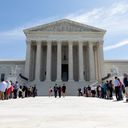Second-term Supreme Court cases to watch

Published Date: 10/18/2019
Source: axios.com
The Supreme Court, now with a solid conservative majority after Justice Brett Kavanaugh's appointment, is hearing cases that could have long-term ramifications on immigration, LGBTQ employment protections and access to abortion.The big picture: The high court — with 5 conservatives and 4 liberals — kept a relatively low profile in its first term this year. But it could hand major wins to Republicans in 2020's second term, emboldened by Kavanaugh's appointment and sharpening their focus as a slew of hot-button disputes work their way up from lower courts.Key cases to watch this term:Consumer Financial Protection Bureau: The court has agreed to consider whether the structure of the CFPB, created in 2010 in the aftermath of the Great Recession, is constitutional. Challengers argue that the CFPB having a single director — which the president cannot fire at will — is a violation of the president's constitutional powers, Axios' Sam Baker writes.Abortion: The Supreme Court agreed to take up a case on Louisiana's abortion law which requires doctors to have admitting privileges at nearby hospitals to perform an abortion.If the court rules in favor of Louisiana's law, it could be more difficult to prove in court that state abortion restrictions are unconstitutional.Abortion rights advocates say the law would leave Louisiana with just 1 clinic.LGBTQ workplace discrimination: The court will hear oral arguments for 3 blockbuster cases on Oct. 8 that question whether Title VII of the 1964 Civil Rights Act prohibits employers from discriminating against workers based on their sexual orientation and status as a transgender person.The law bans discrimination on the basis of race, color, religion, sex and national origin, and the Trump administration told the court last year it does not cover gender identity.Deferred Action for Childhood Arrivals: The Supreme Court will hear a set of lawsuits on Nov. 12 challenging President Trump's effort to end DACA, the Obama-era immigration program that shields roughly 700,000 foreign-born people brought into the United States illegally as children from deportation.Trump sought in 2017 to end the DACA program.Future cases to watch:Puerto Rico's financial crisis: The court will decide if the appointments to the Financial Oversight and Management Board for Puerto Rico were constitutional. A federal appeals court previously ruled the appointments were not constitutional because the Senate didn't confirm them.The Trump administration has argued the lower court's ruling “simultaneously imperiled Puerto Rico’s recovery from the worst fiscal crisis in its history and cast substantial doubt on the constitutionality of territorial self-governance.”Mexico border shooting: The Supreme Court will in the fall decide whether families of Mexican teenagers who were fatally shot by American border agents in Texas and Arizona can sue in U.S. courts for damages, per the AP.The high court heard arguments in Hernandez v. Mesa in February 2017 and sent the case back to a lower court for further proceedings. At the time, the Trump administration argued the teenager's location of death — in Mexico — should result in the dismissal of the case, saying the right to sue “should not be extended to aliens injured abroad.”Affordable Care Act: Legal challenges by Republicans against the ACA, which the court upheld in 2012 and 2015, are likely to reach the high court again.Last year, a Texas federal judge struck down the entire ACA. The case is playing out at the 5th Circuit Court of Appeals in New Orleans. Results of this year's other major cases2020 citizenship question: The court temporarily froze the Trump administration's decision to add a controversial citizenship question to the 2020 census in June, causing the administration to print the census without the question.Commerce Secretary Wilbur Ross defended his decision to add the question, saying he acted solely at the request of the Justice Department to enhance the Voting Rights Act. 2 federal judges who ruled against Ross in January said his reasoning lacks a factual basis and would unconstitutionally suppress census responses from non-citizens.Apple iPhone app pricing: The court allowed a massive antitrust lawsuit against Apple to move forward in May. The suit alleges the company has built an illegal monopoly on the sale of applications for the smartphone, by being the sole distributor of iPhone apps and taking a 30% cut."The ruling could impact a broad range of digital marketplaces, not just Apple's," Axios' Ina Fried notes. Those marketplaces could possibly be exposed to monopoly concerns brought by the people who buy products on them.Partisan gerrymandering: In a move that will allow gerrymandering to get even more aggressive, the court said in June that cases about partisan gerrymandering are "beyond the reach of the federal courts" — a blow to voting-rights activists and Democrats.The ruling will make it harder for minority parties to retake the reins of power — even in wave elections.Double jeopardy: The court decided in June not to overrule its long-standing decision that sometimes allows criminal defendants to be prosecuted twice for the same crimes, once in state court and again in federal court. This case, unrelated to Trump, ultimately affects his ability to pardon people like former campaign chairman Paul Manafort, who was sentenced to 7.5 years in March for crimes uncovered in the Mueller probe.Go deeper: In the Supreme Court, it's all been building to this